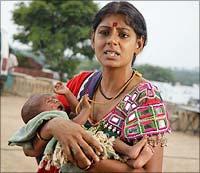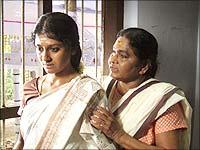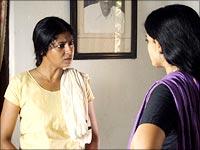A favourite with serious filmmakers, Nandita Das stars as Kamakshi, a spinster, in Nitya Kanyaka, a film based on the novel by Jnanpith Award winner Thakazhi Sivasankara Pillai in 1945.
In the first part of the interview, Shobha Warrier met the actress and got her talking about her experience of working in an Adoor Gopalakrishnan film.
Here, Nandita talks about her motivations behind being an actress. Excerpts:
Why do you think there is no interest in good and different cinema today unlike the '70s?
It has become the chicken and egg situation. Media says people want to know who is getting married to whom, who is eating where and things like that. But people say this is what they give us! We don't know when this started but it has to stop.
I am personally not for banning or anything like that but I feel we have to create alternatives. When we create an alternative, there will be people who will seek that. I say you give people at least the choice. If you and I like something, I am sure there will be more people like us in India.
In fact, I did a Marathi film by Chitra Palekar called Maathi Maay, which was screened in the Toronto, London, Goa and Kerala film festivals. It was also released in Maharashtra. We had a special screening in Delhi and I had told my driver to see it. Even though it was in Marathi with English subtitles -- both languages he does not understand -- he was completely moved by the film.
You've worked for women's and human rights issues. Were you reminded of real life characters while acting in the film?
Absolutely. Because of your experiences, you know a woman like Kamakshi does exist. You also know what she goes through. You are not just playing the character, you are going through the psyche of a person like Kamakshi. I don't think about the character beforehand. Even during the rehearsal, I do only the broad action. Then, in the action and cut, I try and be that person.
 Does that mean you feel the character inside too?
Does that mean you feel the character inside too?
I put myself in Kamakshi's place and ask myself how would I feel during that time, at an unmarriageable age of 25. In a way, at that moment, it is a mix of Nandita and Kamakshi. In every character you play, you lend something of your own and you take something from that person.
Do you feel like an outsider while acting in languages you don't understand?
I don't know where I belong. I am not a Delhi person. If you ask me where I am from, I would say, everywhere. What I am today is because of all the experiences I had from different parts of the country and the world.
I feel like a citizen of the world! I feel fairly comfortable whether I am in Kerala or Bengal or Tamil Nadu. People ask me what kind of food I eat. I tell them, I eat whatever food that belongs to a particular region while I'm there. I don't ever feel like an outsider anywhere. Though I grew up completely in an urban area, I feel very comfortable in rural areas too.
Surprisingly, most of your films are based in rural India...
Yes, they say I have become a spokesperson for the rural woman. I feel happy about it. You know I am just back after acting as a rural Pakistani woman for a Pakistani film!
 Serious filmmakers of India say they think of you whenever there is a strong woman to be depicted. How do you feel about this?
Serious filmmakers of India say they think of you whenever there is a strong woman to be depicted. How do you feel about this?
Honoured. I think it is mainly because they feel I am open to ideas.
You look like a Malayali in a Malayalam film, and a Tamilian in a Tamil film and Bengali in a Bengal film...
I know. Mrinalda used to say something like this: you are ordinarily extraordinary! He says, your face is ordinary enough to be extraordinary everywhere. I take it as a big compliment. If you have a regular Indian face, wear the right costume and right pottu you can be a Malayali, a Bengali or a Tamil or a Marathi.
My father is from Orissa, and my mother from Gujarat and I have learnt many languages from childhood. Perhaps that shows on my face! I think you have to be open-mined and less judgmental to relate to these believable characters, and I do relate to their experiences.
It is not out of any generosity that I do language films; I genuinely enjoy different milieu, eating different types of food and meeting different kinds of people.
Now that you have acted in almost all Indian languages, do you see any underlying commonality in these characters?
Absolutely. You see so many commonalities between the struggles and strengths of women; and these are the things that are highlighted in our films. Whether you do a Rajasthani woman in the desert or a Malayali woman here in Kerala or a Tamil woman in a village in Tamil Nadu, you see in some ways the journeys are the same yet distinct.
Take Kamakashi in Nitya Kanyaka, initially she was miserable because she was not getting married. The man who came to see her opts for her younger sister. Then, her brother and the youngest sister also get married. After going through the journey, she tells herself, you don't have to marry to live life. It's okay to remain unmarried. But to understand life and come to such a conclusion, she had to go through a whole gamut of emotions. If you are sensitive to human conditions, you will relate to her as much as I did.
In your career as an actress, is Kamakashi's journey an enriching experience?
 Yes, every woman I have played on screen has subconsciously added to my overall understanding -- not just intellectual understanding but an emotional understanding, empathy and sensitivity as well. My human rights work impacts my film work and vice versa. Finally you grow as a human being; which is far more important than growing as an actor or activist.
Yes, every woman I have played on screen has subconsciously added to my overall understanding -- not just intellectual understanding but an emotional understanding, empathy and sensitivity as well. My human rights work impacts my film work and vice versa. Finally you grow as a human being; which is far more important than growing as an actor or activist.
Why do you act?
I began acting because it was another medium to convey what I feel strongly about. Films gave me an opportunity to talk about things that are close to my heart. I realise there is a kind of connection between real life and films.
Acting is still an interest for me, and not a profession. As and when I get something interesting, I do it. For months, when I don't get anything interesting, I do something else. So, there is no method in my madness!
Part I of the Nandita Das interview: 'I don't believe in preparing for a role'





